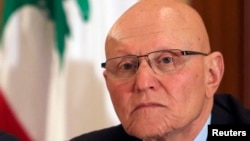BEIRUT —
Lebanese politician Tammam Salam, a former minister from a prominent Sunni Muslim political dynasty, emerged as a potential new prime minister on Thursday when he was endorsed by the country's pro-Western March 14 coalition.
Lebanon faces a parliamentary election in June but was plunged into uncertainty two weeks ago by the resignation of Prime Minister Najib Mikati, after a dispute over the electoral law and an extension to the term of a top security official.
Mikati, who had called for a “national salvation” government to ensure stability in a country shaken by the conflict in neighboring Syria, said on Thursday he would not put his name forward again because he could not win consensus backing.
Salam - a Sunni Muslim as all prime ministers must be under Lebanon's confessional distribution of power - is the son of a former prime minister. His grandfather served under the Ottoman Empire and the French colonial mandate.
He won endorsement from March 14, which has 60 seats in the 128-seat parliament, at a meeting of the political alliance in central Beirut after a lightning trip to Saudi Arabia for talks with March 14's leader, former prime minister Saad al-Hariri.
March 14 groups mainly Sunni and Christian parties which pushed, with U.S. and European support, for Syria to end nearly three decades of military presence in Lebanon in 2005.
Salam was also expected to win the support of Druze leader Walid Jumblatt, whose seven seats hold the balance of power.
The other main political bloc is the March 8 coalition which dominated Mikati's government and is made up of Shi'ite parties Hezbollah and Amal and their mainly Christian allies, including the Free Patriotic Movement of Michel Aoun.
Sources in March 8 said it had not decided whether to support Salam, but that on its own it could not block him.
President Michel Suleiman will hold formal consultations on Friday and Saturday before nominating a prime minister to form the new government.
Political sources said that if Salam is nominated he would head a neutral government tasked with preparing for the election and would not be expected to stand as candidate himself.
The vote, set for early June, is likely to be delayed after disputes over whether it should be a winner-takes-all election or follow proportional representation - or be a hybrid of both.
The disputes add to tension in a country struggling to deal with over 400,000 Syrian refugees - equivalent to 10 percent of the population - street battles in the northern city of Tripoli, violence in border areas and a spiraling budget deficit.
Mikati championed a policy of "dissociation'' from the crisis in Syria but struggled to insulate his country from the turmoil. Iranian-backed Hezbollah and its allies in his cabinet are strong supporters of Syrian President Bashar al-Assad, while most Sunni Muslims support rebels battling to topple Assad.
Born in 1945, Salam was culture minister from 2008 to 2009.
Lebanon faces a parliamentary election in June but was plunged into uncertainty two weeks ago by the resignation of Prime Minister Najib Mikati, after a dispute over the electoral law and an extension to the term of a top security official.
Mikati, who had called for a “national salvation” government to ensure stability in a country shaken by the conflict in neighboring Syria, said on Thursday he would not put his name forward again because he could not win consensus backing.
Salam - a Sunni Muslim as all prime ministers must be under Lebanon's confessional distribution of power - is the son of a former prime minister. His grandfather served under the Ottoman Empire and the French colonial mandate.
He won endorsement from March 14, which has 60 seats in the 128-seat parliament, at a meeting of the political alliance in central Beirut after a lightning trip to Saudi Arabia for talks with March 14's leader, former prime minister Saad al-Hariri.
March 14 groups mainly Sunni and Christian parties which pushed, with U.S. and European support, for Syria to end nearly three decades of military presence in Lebanon in 2005.
Salam was also expected to win the support of Druze leader Walid Jumblatt, whose seven seats hold the balance of power.
The other main political bloc is the March 8 coalition which dominated Mikati's government and is made up of Shi'ite parties Hezbollah and Amal and their mainly Christian allies, including the Free Patriotic Movement of Michel Aoun.
Sources in March 8 said it had not decided whether to support Salam, but that on its own it could not block him.
President Michel Suleiman will hold formal consultations on Friday and Saturday before nominating a prime minister to form the new government.
Political sources said that if Salam is nominated he would head a neutral government tasked with preparing for the election and would not be expected to stand as candidate himself.
The vote, set for early June, is likely to be delayed after disputes over whether it should be a winner-takes-all election or follow proportional representation - or be a hybrid of both.
The disputes add to tension in a country struggling to deal with over 400,000 Syrian refugees - equivalent to 10 percent of the population - street battles in the northern city of Tripoli, violence in border areas and a spiraling budget deficit.
Mikati championed a policy of "dissociation'' from the crisis in Syria but struggled to insulate his country from the turmoil. Iranian-backed Hezbollah and its allies in his cabinet are strong supporters of Syrian President Bashar al-Assad, while most Sunni Muslims support rebels battling to topple Assad.
Born in 1945, Salam was culture minister from 2008 to 2009.












